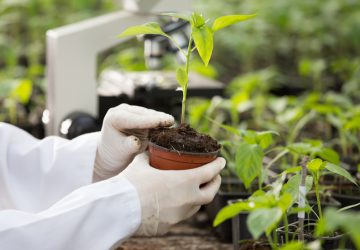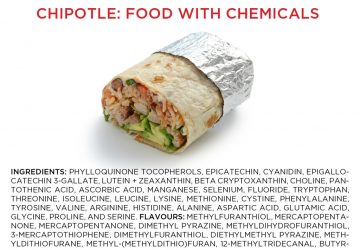In the last half-century, the number of people fed by a single U.S. farmer has grown from 19 to 129. Despite this stunning advance, intractable health and nutrition problems remain.
The world’s population continues to grow even as available farmland shrinks. Preventable illnesses and malnutrition still claim the lives of many children in the developing world.
As the new millennium gets under way, policy-makers, health-care professionals, scientists and others are searching for the tools to meet the increasing demands of a growing and changing world.
Chief among these tools is biotechnology, which has the potential to become a revolutionary force in world history as far-reaching as the industrial and information revolutions.
Consider the potential applications noted by more than 500 scientists who recently signed a letter to me endorsing biotechnology. As these scientists noted, “In developing countries, biotechnological advances will provide the means to overcome vitamin deficiencies, to supply vaccines for killer diseases like cholera and malaria, to increase production and protect fragile natural resources, and to grow crops under normally-unfavorable conditions.”
For thousands of years, farmers have fought numerous species of insects that have destroyed crops and hurt production.
Biotechnology in agriculture will bring hope to those in the developing world by providing crops that are more tolerant of drought, and more resistant to insects and weeds, thus increasing farm production. Already a gene known as Bt, taken from the soil, can be transplanted into corn and potatoes and functions as an insecticide, allowing farmers to produce more food with fewer chemicals.
Increased production is not the only benefit. According to the International Food Policy Research Institute, more than 800 million people worldwide go to bed hungry. More than 170 million preschool children are undernourished, and 5 million of them will die every year from nutrition-related illnesses.
Biotechnology will also increase the nutritional value of foods produced by increasing the vitamin and mineral content of crops grown. In fact, world health experts predict that development of a genetically modified rice will prevent the deaths of as many as 2 million children and 500,000 cases of blindness each year caused by vitamin A deficiency.
Biotechnology will also bring about health benefits for rich and poor nations alike. As Gregg Easterbrook pointed out in The New York Times in November, researchers at Cornell University are working to transfer the genetic code for the hepatitis B vaccine into bananas.
If that occurs, it will preclude the need for the current expensive, painful, three-shot course currently required to vaccinate against this debilitating illness.
Despite the remarkable promise of biotechnology to improve the plight of the world’s hungry and sick, a vocal, aggressive, and _ in some cases, lawless _ group of advocacy organizations seeks to discredit and eliminate biotechnology.
At issue for these groups is the alleged risk that any genetically modified plant may pose to the environment. Yes, we must understand if genetically modified crops, for example, pose a greater risk to wildlife than the existing practice of using synthetic chemicals. However, the greater risk, in my view, is that without scientific basis, the nay-sayers may succeed in their goal to subvert biotechnology and condemn the world’s children to unnecessary malnutrition, blindness, sickness, and environmental degradation.
Opposition of the sort I witnessed first hand while at last December’s World Trade Organization meeting in Seattle has been driven variously by trade-protectionist and anti-corporate sentiment, and by the scientifically unsubstantiated fears of change and technology.
There are strong elements in the European Union who are more than happy to exploit fears – fears that they helped create – to provide short-term protections to their farmers from imports.
Opportunistic food companies are knowingly undermining our scientists and trade negotiators to placate the protectionists. Sadly, the actions of American radicals like those who vandalized test plots in California and set fire to research offices at Michigan State University in January are not harmless pranks; rather, such tactics threaten lives and lead to diminished public understanding of the benefits versus the risks of biotechnology.
The development of this technology is not inconsequential. Our scientists are attempting to solve the real-world problems of sickness and hunger.
The world’s hungry and sick cannot afford the hysteria and unworkable propositions advanced by those who can take their next meal for granted. It will be up to the policy makers and scientists to ensure that reason, not hype, prevails as we proceed with the biotechnology revolution.
Sen. Christopher “Kit” Bond , R-Mo., is chairman of the Senate Small Business Committee and a member of the Senate Environment Committee. Readers may write to him at:
274 Russell Senate Office Building
Washington, D.C. 20510




